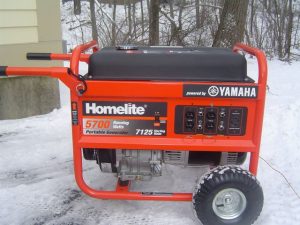Recommendation on Choosing between a Gasoline Powered Generator and a Diesel One
By Mark J. Donovan
|
|
Question: Hello Mark, I have written to you previously and have always received some good and sound advice in return. This time I am trying to research and get some solid advice on portable generators. I have narrowed my information to the following:
Herein, lays my question: I am trying to determine whether to purchase a gasoline operated portable generator or a diesel one and would like your opinion, as I am not quite sure if my research is broad enough to make an informed decision. |
If I purchase a gasoline operated portable generator I have narrowed it down to two brand names; one being Generac, and the other being Briggs&Stratton. If I purchase a diesel portable generator I am quite impressed with the Aurora line of generators. Any assistance/information you can provide is much appreciated.
Answer: Hi Mike, I have a gasoline powered portable generator (Homelite with a Yamaha engine). It has a starting wattage rating of 7125 watts and a running rating of 5700 watts. It has been adequate for meeting my home’s needs. I installed a sub-panel adjacent to my main circuit panel. I transferred onto the sub-panel the following circuits:
- Well pump
- Oil-Fired Hot Water Boiler Circuit
- Kitchen Circuits (Refrigerator and other ancillary countertop outlets)
- Bathroom Circuits (for both levels of house)
- Hallway lights on each floor of house, along with kitchen/dining room light
- Main entranceway lights (along with outside lights to main entrance)
| The generator has a 30 amp circuit breaker, so I also included a 30amp circuit breaker for it that connects to a male coupling connection on the outside of the house.
Lastly, I installed a 30amp circuit breaker that is fed by the main panel. I have a mechanical safety lockout switch that sits between the 30 amp generator circuit breaker and the 30 amp main circuit breaker. This way only one can be in the ON position at any one time. With this configuration, when we lose power I simply throw the main circuit panel breaker (200 amp) to the off position. |
 |
I then turn off the 30 amp circuit breaker (associated with the main circuit panel) in the sub-panel, and turn the portable generator circuit breaker to the on position. I then turn off all of the circuit breakers on the sub-panel before firing up the portable generator.
Once I’ve connected up the generator to the outside male coupling connection and fire up the generator I then start turning on the individual circuit breakers in the sub-panel.
We have been without power for up to 11 days. You’d be surprised how few gas stations were open during that period in the town. I can’t imagine what I would have done if I had ran out of diesel and the only two service stations in town that sold diesel were closed.
In regards to specific portable generators I cannot offer any opinion. Traditionally Briggs&Stratton has made very good engines/products. If you decided to go with diesel then I would suggest making sure you keep sufficient diesel on your property so that you avoid the concern I mentioned.
For help on building a new custom home, see HomeAdditionPlus.com’s New Home Construction Bid Sheet. The New Home Construction Bid Sheet provides you with the knowledge on how to plan a custom home building project, and what to look for when hiring contractors for your new home construction. It also includes a detailed cost breakdown table and spreadsheet for estimating your own new home construction building costs.
Related Information
Additional Electrical Wiring Resources from Amazon.com
 |
 |
Free Home Addition Price Quotes with No Obligation!
Fill out our 3-5 minute quick and easy form, and receive a free price quote on a house addition from one of our prescreened and licensed home addition contractors. This process is free and there is no obligation to continue once you receive your house addition price estimate.

